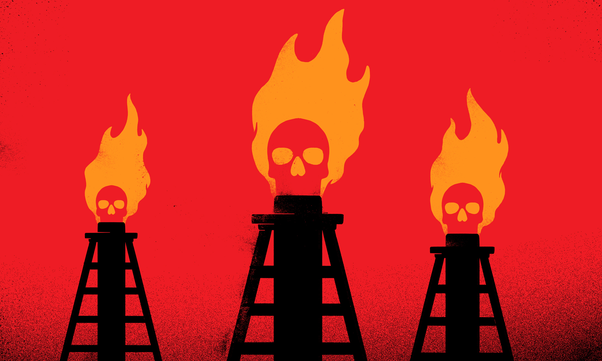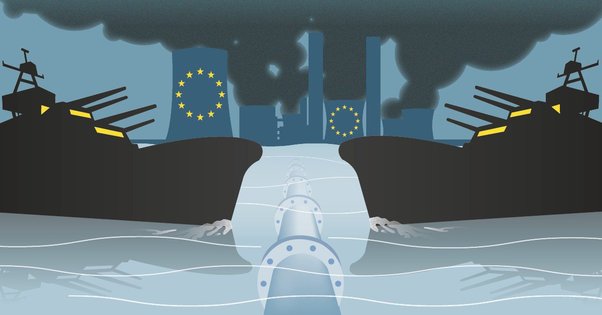Gas is ruining our climate and, as consumers struggle to keep warm, has proven itself an expensive way to enrich companies causing the climate emergency.
It is time to immediately phase out unreliable gas and invest in the renewable energy and energy efficiency that we need.

The past few months have been bleak for millions of people who use fossil gas to warm their homes and cook their dinners, with gas prices rapidly increasing across Europe and the US.
In contrast, many of the world’s largest gas producers – including Chevron, Exxon, Gazprom, Saudi Aramco, and Total – have had a much sunnier time. Of the top 20 gas producers for which data is available, companies raked in profits of $65 billion between July and September alone.
Consumers are paying
A third of the energy used in European homes comes from gas, and half of American homes rely upon it. This is a problem, because the price of gas has jumped this summer. Between June and September, consumer gas costs rose nearly 8 percent in Europe and nearly 7 percent in the US. In the UK, gas prices for customers have jumped nearly 30 percent in the past year and are driving extraordinary inflation.
These price hikes have hurt some more than others. Belgium and France have been hit particularly hard, with consumer prices rising by more than 15 and 17 percent, respectively.
Consumers’ energy costs have jumped throughout 2021
Energy bills in Europe and American have increased in every month of 2021
But it is the poorest who will be most at risk, as high energy costs eat further into smaller incomes. In Romania, which has Europe’s highest rate of people at risk of poverty, prices have jumped nearly 19 percent. Meanwhile in the US, while consumers’ bills have not yet risen much, they are projected to soon increase by upwards of 30 percent.
Companies are profiting
While some of the most vulnerable people have to choose between heating and eating, many of the world’s largest fossil fuel companies are posting eye-watering profits. Global Witness reviewed profits announced by the world’s top 20 gas producers between July and September, when consumers’ prices were going up. For those companies that provided data, they together amassed at least $65 billion in profits.
The total for all 20 companies would be even higher as six of those reviewed did not publish their results for the period. They include profits companies made from gas, oil, and other income. Yet between July and September – referred to as a year’s third quarter, or Q3 – the wholesale price on Europe’s main gas market more than trebled, while the Brent Crude price of oil increased by only 11 percent.
Most of the companies that have done well during the energy crisis are familiar to consumers. Saudi Arabia’s Aramco made the most – $30 billion – between July and September. During the same period, Total, Equinor, and Eni together made over $7 billion while Exxon and Chevron each made over $6 billion in profits
BP and Shell both recorded losses in Q3, although BP highlighted its big “replacement cost” profits, which the company said better accounted for price fluctuations, which the company said better accounted for price fluctuations.
Gas companies’ unusually large profits
4 of the top 5 reporting gas producers reported much higher profits in Q3 2021 compared to Q3 2019 – before the pandemic
Particularly telling for Europeans are the profits reported by Gazprom, which supplies nearly a third of Europe’s gas has been accused by some EU parliamentarians of aggravating the crisis by limiting Europe’s supply. In Q3 the company made $8 billion.
Full calculations for how much companies have made can be found here.
These profits are extraordinary. Taken together, companies’ 2021 Q3 profits were a remarkable 24 percent higher than during the same period in 2019, before the COVID 19 pandemic temporarily depressed gas prices. Companies also made over 500 percent more than in 2020, although given the pandemic’s impact, this comparison is less telling.
For some companies, profits have also steadily increased over 2021. Taken together, companies’ profits rose 7 percent between Q1 and Q2, and another 4 percent between Q2 and Q3. These rises came as consumers’ energy bills were rapidly increasing.
Profits have jumped throughout 2021
Gas companies analysed together increased profits each quarter of 2021
Companies’ profits are linked to the crisis. According to Total, which made $4.8 billion between July and September, the company particularly benefitted from gas sales while prices were high. BP CEO Bernard Looney was more blunt, declaring that – despite his company’s Q3 loss – strong gas and oil prices had made BP a “cash machine.”
For his part, Chevron CFO Pierre Breber expressed “empathy” towards those who would be hurt by high prices. However, despite Chevron making $6.1 billion in just three months, Breber said it was the responsibility of “the government and others” to help those hurt by the energy crisis.
Good money after bad
Governments do, of course, have a role in regulating consumers’ energy prices, including setting caps on what local energy utilities can charge and the profits they make. From Rome to Sophia, authorities are pouring in additional taxpayer funds to help people and businesses pay their bills. In the US, the Biden administration is spending billions to help the most vulnerable and has requested a Federal Trade Commission investigation into potential profiteering by companies supplying gasoline.
It is right that, in the immediate term, the most at risk should receive progressive relief from energy bills. However, it is also wrong for gas consumers to face costs they cannot afford and for governments to spend a fortune protecting them while the companies that produce the gas make billions.
In fact, the most important lesson governments can learn from those profiting during the energy crisis is the need to quickly end our reliance on gas in favour of renewable energy. In much of the world, building renewable energy sources like wind or solar is cheaper than running existing gas or coal-fired plants. According to one study, all of Europe’s home heating needs could be met by renewable sources if governments increased subsidies by €70 billion – about the same as the gas companies made in Q3 alone.
Just as important, switching from gas to renewable energy will also stop wasteful spending on an industry whose days are numbered and assets will soon be stranded. If we are to stop the worst impacts of the climate emergency, the International Energy Agency has stated that we cannot extract any more fossil fuel from new fields. Yet in 2022, the companies Global Witness analysed will spend over $82 billion exploring for fossil fuels and building new wells, according to the energy data firm Rystad. In Europe, companies also want to build new gas transportation infrastructure that could cost $87 billion.
As people across Europe and the US struggle to pay their energy bills while watching gas companies – including those based in their countries – making billions, they are entitled to demand better. EU leaders debating whether to support gas infrastructure and subsidies, and American officials currently negotiating climate change legislation, must pay attention. Gas is expensive, unreliable, and – for the people, for the climate – must be abandoned.


